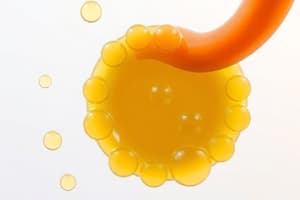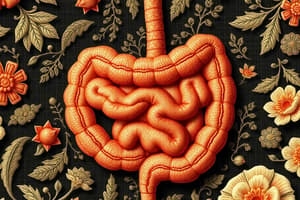Podcast
Questions and Answers
What is primarily responsible for the hydrolysis of triglycerides in the small intestine?
What is primarily responsible for the hydrolysis of triglycerides in the small intestine?
- Pancreatic lipases (correct)
- Liver enzymes
- Salivary amylase
- Intestinal bile acids
How do chylomicrons function in lipid transport?
How do chylomicrons function in lipid transport?
- They are absorbed directly into the bloodstream from the intestines.
- They convert cholesterol into bile acids for digestion.
- They are packaged lipids transported in the lymphatic system. (correct)
- They break down dietary triglycerides into fatty acids.
What role do bile acids play in lipid absorption?
What role do bile acids play in lipid absorption?
- They transport cholesterol directly into the liver.
- They emulsify lipids, forming micelles. (correct)
- They are converted into triglycerides in the bloodstream.
- They hydrolyze triglycerides into glycerol and fatty acids.
Which of the following is true regarding the composition of chylomicrons?
Which of the following is true regarding the composition of chylomicrons?
What is the primary difference in absorption between small and large lipid molecules?
What is the primary difference in absorption between small and large lipid molecules?
What is the function of LDL in the body?
What is the function of LDL in the body?
What is a health implication of high levels of LDL?
What is a health implication of high levels of LDL?
How are the sizes of lipoproteins primarily categorized?
How are the sizes of lipoproteins primarily categorized?
What is the primary function of HDL cholesterol in the body?
What is the primary function of HDL cholesterol in the body?
Which lipoprotein type is most directly linked to the risk of cardiovascular disease?
Which lipoprotein type is most directly linked to the risk of cardiovascular disease?
What process is described as transporting cholesterol from the tissues back to the liver?
What process is described as transporting cholesterol from the tissues back to the liver?
Which dietary component is recommended to help lower LDL cholesterol levels?
Which dietary component is recommended to help lower LDL cholesterol levels?
Atherosclerosis is primarily responsible for which condition?
Atherosclerosis is primarily responsible for which condition?
What lifestyle factor can contribute to improving HDL cholesterol levels?
What lifestyle factor can contribute to improving HDL cholesterol levels?
Which type of fat is prioritized for a heart-healthy diet?
Which type of fat is prioritized for a heart-healthy diet?
What is a common result of elevated LDL cholesterol in the arteries?
What is a common result of elevated LDL cholesterol in the arteries?
What role do phytochemicals play in lipid health?
What role do phytochemicals play in lipid health?
What is the consequence of restricted blood flow due to plaque buildup in arteries?
What is the consequence of restricted blood flow due to plaque buildup in arteries?
What is the basic structure of all fatty acids?
What is the basic structure of all fatty acids?
Which fatty acids are classified as essential fatty acids?
Which fatty acids are classified as essential fatty acids?
What characterizes the classification of fatty acids in terms of saturation?
What characterizes the classification of fatty acids in terms of saturation?
What is the significance of the carbon chain length in fatty acids?
What is the significance of the carbon chain length in fatty acids?
Which of the following lipids are known to be insoluble in water?
Which of the following lipids are known to be insoluble in water?
What are the most common fatty acids found in foods?
What are the most common fatty acids found in foods?
What type of unsaturated fatty acid contains one double bond?
What type of unsaturated fatty acid contains one double bond?
Which of the following fatty acids is classified as omega-3?
Which of the following fatty acids is classified as omega-3?
Which lipid group includes compounds that help transport cholesterol in the bloodstream?
Which lipid group includes compounds that help transport cholesterol in the bloodstream?
How do polyunsaturated fatty acids differ from saturated fatty acids?
How do polyunsaturated fatty acids differ from saturated fatty acids?
What is the primary goal of fat digestion?
What is the primary goal of fat digestion?
Which type of cholesterol is produced within the body?
Which type of cholesterol is produced within the body?
What is the main adverse effect of cholesterol accumulation in the body?
What is the main adverse effect of cholesterol accumulation in the body?
Which hormones are classified as sterols vital for body functions?
Which hormones are classified as sterols vital for body functions?
What is the primary role of low-density lipoprotein (LDL)?
What is the primary role of low-density lipoprotein (LDL)?
What is the primary role of chylomicrons in lipid transport?
What is the primary role of chylomicrons in lipid transport?
How are VLDL converted into LDL during transport?
How are VLDL converted into LDL during transport?
What component is primarily removed by HDL from the cells?
What component is primarily removed by HDL from the cells?
Which tissue types rely on LDL for the delivery of its contents?
Which tissue types rely on LDL for the delivery of its contents?
What happens to most triglycerides within 14 hours after absorption?
What happens to most triglycerides within 14 hours after absorption?
What is the function of special receptors on liver cells concerning LDL?
What is the function of special receptors on liver cells concerning LDL?
Which lipoprotein is primarily responsible for transporting lipids made in the liver?
Which lipoprotein is primarily responsible for transporting lipids made in the liver?
What types of lipids do cells primarily extract from LDL?
What types of lipids do cells primarily extract from LDL?
What key component differentiates HDL from VLDL and LDL?
What key component differentiates HDL from VLDL and LDL?
What is a health implication of high levels of LDL cholesterol in the bloodstream?
What is a health implication of high levels of LDL cholesterol in the bloodstream?
What is a potential consequence of a deficiency in vitamin A?
What is a potential consequence of a deficiency in vitamin A?
What is the recommended dietary allowance (RDA) of vitamin D for adults over the age of 70?
What is the recommended dietary allowance (RDA) of vitamin D for adults over the age of 70?
Which of the following foods is NOT rich in vitamin A?
Which of the following foods is NOT rich in vitamin A?
What could be a toxic effect of excessive vitamin A consumption?
What could be a toxic effect of excessive vitamin A consumption?
How many vitamins and minerals are identified as essential for bodily functions?
How many vitamins and minerals are identified as essential for bodily functions?
What is the main health benefit of vitamin D besides bone health?
What is the main health benefit of vitamin D besides bone health?
Which vitamin is primarily responsible for promoting good vision?
Which vitamin is primarily responsible for promoting good vision?
What type of vitamins can lead to toxicity when consumed in excess?
What type of vitamins can lead to toxicity when consumed in excess?
What are carotenoids converted into in the body?
What are carotenoids converted into in the body?
What is one of the effects of vitamin A toxicity on health?
What is one of the effects of vitamin A toxicity on health?
What is the primary health risk associated with excessive sodium intake?
What is the primary health risk associated with excessive sodium intake?
Which deficiency can lead to osteomalacia and osteoporosis?
Which deficiency can lead to osteomalacia and osteoporosis?
What is the recommended daily sodium intake for an average adult?
What is the recommended daily sodium intake for an average adult?
What is a common source of Vitamin E?
What is a common source of Vitamin E?
What mineral is most abundantly stored in the human body, primarily in the bones?
What mineral is most abundantly stored in the human body, primarily in the bones?
Which mineral is classified as a trace mineral?
Which mineral is classified as a trace mineral?
Which of the following foods is a good source of non-heme iron?
Which of the following foods is a good source of non-heme iron?
What health condition is related to a deficiency of thiamin (Vitamin B-1)?
What health condition is related to a deficiency of thiamin (Vitamin B-1)?
How much calcium do males and females aged 19-50 need daily?
How much calcium do males and females aged 19-50 need daily?
Which food is known to provide a significant amount of Vitamin K?
Which food is known to provide a significant amount of Vitamin K?
What effect can a deficiency in iron have on the body?
What effect can a deficiency in iron have on the body?
Which of these is recommended for reducing sodium intake effectively?
Which of these is recommended for reducing sodium intake effectively?
What is a potential effect of excessive sodium intake?
What is a potential effect of excessive sodium intake?
Which vitamin is key for red blood cell formation?
Which vitamin is key for red blood cell formation?
What should be done before taking iron supplements?
What should be done before taking iron supplements?
Which food is the richest source of calcium among the options listed?
Which food is the richest source of calcium among the options listed?
What is the primary dietary source of Vitamin B-12?
What is the primary dietary source of Vitamin B-12?
Which condition is often treated with iron supplements?
Which condition is often treated with iron supplements?
What is the significance of sodium in the body?
What is the significance of sodium in the body?
Which vitamin is vital for the absorption of iron?
Which vitamin is vital for the absorption of iron?
What is a primary consequence of Vitamin D deficiency?
What is a primary consequence of Vitamin D deficiency?
Which of the following foods is an excellent source of calcium?
Which of the following foods is an excellent source of calcium?
What is a common health effect of excessive sodium intake?
What is a common health effect of excessive sodium intake?
What condition is often linked to iron deficiency?
What condition is often linked to iron deficiency?
Which vitamin deficiency may lead to a weakened immune system?
Which vitamin deficiency may lead to a weakened immune system?
What is the recommended dietary allowance (RDA) for Vitamin D for adults aged 70 and older?
What is the recommended dietary allowance (RDA) for Vitamin D for adults aged 70 and older?
Which of the following is NOT a function of Vitamin A?
Which of the following is NOT a function of Vitamin A?
What could potentially occur with excessive intake of fat-soluble vitamins?
What could potentially occur with excessive intake of fat-soluble vitamins?
Which of the following foods is rich in carotenoids, a source of Vitamin A?
Which of the following foods is rich in carotenoids, a source of Vitamin A?
What is the consequence of a deficiency in Vitamin A?
What is the consequence of a deficiency in Vitamin A?
What is a potential consequence of vitamin D deficiency?
What is a potential consequence of vitamin D deficiency?
What is a possible consequence of excessive sodium intake?
What is a possible consequence of excessive sodium intake?
Which of the following is a potential source of calcium in the diet?
Which of the following is a potential source of calcium in the diet?
Which of the following food sources is highest in calcium?
Which of the following food sources is highest in calcium?
Which category of minerals includes calcium and potassium?
Which category of minerals includes calcium and potassium?
What is the recommended daily sodium intake range for adults?
What is the recommended daily sodium intake range for adults?
What is a significant health effect of excessive sodium intake?
What is a significant health effect of excessive sodium intake?
What is a common treatment for iron deficiency?
What is a common treatment for iron deficiency?
What primary function does calcium serve in the human body?
What primary function does calcium serve in the human body?
Which vitamin assists in red blood cell formation and can lead to anemia if deficient?
Which vitamin assists in red blood cell formation and can lead to anemia if deficient?
Which source is best for obtaining heme iron?
Which source is best for obtaining heme iron?
What is the minimum daily iron requirement for adults to prevent deficiency?
What is the minimum daily iron requirement for adults to prevent deficiency?
Which vitamin is essential for maintaining healthy muscles and tissues, and its deficiency is very rare?
Which vitamin is essential for maintaining healthy muscles and tissues, and its deficiency is very rare?
What vitamin deficiency might lead to fatigue, nausea, and nerve damage?
What vitamin deficiency might lead to fatigue, nausea, and nerve damage?
In which population group is iron deficiency most prevalent?
In which population group is iron deficiency most prevalent?
Which beneficial role does vitamin K play in the body?
Which beneficial role does vitamin K play in the body?
Which of the following practices can help reduce sodium intake?
Which of the following practices can help reduce sodium intake?
Which mineral is classified as a trace mineral and is vital for enzyme function?
Which mineral is classified as a trace mineral and is vital for enzyme function?
Which food would likely provide non-heme iron?
Which food would likely provide non-heme iron?
What might be a healthy approach to manage iron intake from diet?
What might be a healthy approach to manage iron intake from diet?
Study Notes
Bile and Lipid Digestion
- Bile acids, derived from cholesterol, assist in fat digestion and absorption in the small intestine.
- Bile acids often form complexes with amino acids to aid in emulsifying fats.
Lipid Hydrolysis and Absorption
- Hydrolysis of triglycerides primarily occurs in the small intestine, facilitated by pancreatic lipases.
- Enzymes break down triglycerides into glycerol and fatty acids, allowing absorption of sterols in their active form.
Molecular Absorption
- Small molecules (glycerol and short- to medium-chain fatty acids) are absorbed directly into the bloodstream.
- Larger molecules (monoglycerides and long-chain fatty acids) are emulsified into micelles by bile, facilitating their diffusion into intestinal cells where they are reassembled into triglycerides.
Chylomicrons and Lipid Transport
- Newly formed triglycerides and lipids (cholesterol, phospholipids) are combined with proteins to create chylomicrons for transport through the lymphatic system.
- Chylomicrons, the largest lipoproteins, transport dietary lipids from the small intestine; they deplete triglycerides within 14 hours post-absorption.
VLDL and LDL
- Very-low-density lipoproteins (VLDL) transport lipids produced in the liver and from chylomicron remnants, undergoing transformation to low-density lipoproteins (LDL) as triglycerides are depleted.
- LDL carries cholesterol to tissues, allowing cells to utilize it for energy, hormone production, or membrane synthesis; liver receptors regulate LDL levels in circulation.
HDL and Reverse Cholesterol Transport
- High-density lipoproteins (HDL) are produced by the liver to collect excess cholesterol from cells and return it for recycling or disposal.
- HDL aids in preventing plaque formation and offers anti-inflammatory effects, lowering heart disease risk.
Health Implications
- LDL cholesterol is directly linked to cardiovascular disease (CVD), serving as a major risk factor when levels are elevated due to its accumulation in arteries.
- Effective management of cholesterol levels includes weight control, a balanced diet favoring unsaturated fats, soluble fibers, and regular physical activity.
Fatty Acids and Triglycerides
- Triglycerides consist of one glycerol molecule and three fatty acids, typically between 4 to 24 carbon atoms in length.
- Fatty acids can be saturated or unsaturated, with essential fatty acids being omega-3 (linolenic) and omega-6 (linoleic).
Sterols and Their Roles
- Sterols comprise compounds with a four-ring structure, the most notable being cholesterol, which is crucial for several body functions, including hormone production and bile acid formation.
- Cholesterol can be endogenous (produced by the body) or exogenous (derived from diet), with the liver synthesizing 800 to 1500 mg per day.
Cholesterol and Atherosclerosis
- Excess cholesterol can lead to plaque buildup in arteries, contributing to atherosclerosis, heart attacks, and strokes.
- The daily recommended limit for dietary cholesterol is 300 mg, with imbalances in cholesterol levels posing significant health risks.
Sodium
- Maintains fluid balance and assists in nerve impulse transmission.
- Influences muscle contraction and relaxation.
- Recommended intake is 1,500 to 2,400 mg/day; average American intake ranges from 2,300 to 6,900 mg/day.
- Excess sodium can lead to high blood pressure and fluid retention.
- Reduce sodium by eating fresh foods, limiting processed foods, and experimenting with seasonings.
Calcium
- The most abundant mineral in the body, with 99% stored in bones.
- Essential for bone health.
- Daily requirement for males and females aged 19-50 is 1,000 mg.
- High-calcium foods include yogurt, milk, fortified juices, and sardines.
Iron
- The most common nutritional deficiency worldwide.
- 70% of the body’s iron is in hemoglobin; essential for oxygen transport.
- Heme iron is found in animal products; non-heme iron is in plant products.
- Inefficient iron uptake may result from poor diet, malabsorption, or limited sunlight exposure.
Vitamin D
- Vital for bone health; aids calcium absorption.
- Deficiency can lead to osteomalacia or osteoporosis.
- Daily sunlight exposure of 10 minutes is beneficial; find in fortified milk, tuna, and salmon.
- Supplements may be necessary, but consult a doctor before use.
Vitamin E
- Crucial for the health of red blood cells, muscles, and tissues.
- Deficiency and toxicity are rare, but it can act as a blood thinner.
- Found in vegetable oils, whole grain cereals, and nuts.
Vitamin K
- Key for blood clotting and bone health.
- Primarily produced in the intestines.
- Dietary sources include leafy greens (spinach, kale) and cruciferous vegetables (cauliflower, broccoli).
Water-Soluble Vitamins
- Includes B vitamins (B-1, B-2, B-3, B-6, B-12, folic acid, pantothenic acid, biotin) and vitamin C.
- Thiamin (B-1) supports energy conversion; deficiency can cause fatigue and nerve damage.
- Riboflavin (B-2) aids metabolism; deficiency may lead to dry skin.
- Niacin (B-3) supports energy production; severe deficiency can cause dermatitis and dementia.
- Pyridoxine (B-6) involved in protein metabolism; deficiency can cause nervous system disorders.
- Cobalamin (B-12) is essential for nervous system health; found exclusively in animal products.
- Folic acid is vital for red blood cell formation; deficiency can result in anemia.
Vitamin C
- Aids bone health, blood vessel integrity, and iron absorption.
- Rare deficiencies are observed.
- Rich sources include citrus fruits, berries, and tomatoes.
Minerals
- The body requires 22 minerals, divided into major (e.g., calcium, sodium) and trace (e.g., iron, zinc) categories.
Fat-Soluble Vitamins
- Include vitamins A, D, E, and K.
- Excessive intake can lead to toxicity as they are stored in the liver and fat tissues.
Vitamin A (Retinol)
- Essential for vision, skin health, and bone maintenance.
- RDA is 900 micrograms for men and 700 for women.
- Sources include liver, eggs, and orange/yellow fruits and vegetables.
Vitamin D – "The Sunshine Vitamin"
- Crucial for the formation and maintenance of bones and teeth.
- Recommended intake increases with age; 5 mcg until 50, 10 mcg from 50 to 70, and 15 mcg for those over 70.
- Deficiencies are increasingly recognized as a health concern.
Sodium
- Maintains fluid balance and assists in nerve impulse transmission.
- Influences muscle contraction and relaxation.
- Recommended intake is 1,500 to 2,400 mg/day; average American intake ranges from 2,300 to 6,900 mg/day.
- Excess sodium can lead to high blood pressure and fluid retention.
- Reduce sodium by eating fresh foods, limiting processed foods, and experimenting with seasonings.
Calcium
- The most abundant mineral in the body, with 99% stored in bones.
- Essential for bone health.
- Daily requirement for males and females aged 19-50 is 1,000 mg.
- High-calcium foods include yogurt, milk, fortified juices, and sardines.
Iron
- The most common nutritional deficiency worldwide.
- 70% of the body’s iron is in hemoglobin; essential for oxygen transport.
- Heme iron is found in animal products; non-heme iron is in plant products.
- Inefficient iron uptake may result from poor diet, malabsorption, or limited sunlight exposure.
Vitamin D
- Vital for bone health; aids calcium absorption.
- Deficiency can lead to osteomalacia or osteoporosis.
- Daily sunlight exposure of 10 minutes is beneficial; find in fortified milk, tuna, and salmon.
- Supplements may be necessary, but consult a doctor before use.
Vitamin E
- Crucial for the health of red blood cells, muscles, and tissues.
- Deficiency and toxicity are rare, but it can act as a blood thinner.
- Found in vegetable oils, whole grain cereals, and nuts.
Vitamin K
- Key for blood clotting and bone health.
- Primarily produced in the intestines.
- Dietary sources include leafy greens (spinach, kale) and cruciferous vegetables (cauliflower, broccoli).
Water-Soluble Vitamins
- Includes B vitamins (B-1, B-2, B-3, B-6, B-12, folic acid, pantothenic acid, biotin) and vitamin C.
- Thiamin (B-1) supports energy conversion; deficiency can cause fatigue and nerve damage.
- Riboflavin (B-2) aids metabolism; deficiency may lead to dry skin.
- Niacin (B-3) supports energy production; severe deficiency can cause dermatitis and dementia.
- Pyridoxine (B-6) involved in protein metabolism; deficiency can cause nervous system disorders.
- Cobalamin (B-12) is essential for nervous system health; found exclusively in animal products.
- Folic acid is vital for red blood cell formation; deficiency can result in anemia.
Vitamin C
- Aids bone health, blood vessel integrity, and iron absorption.
- Rare deficiencies are observed.
- Rich sources include citrus fruits, berries, and tomatoes.
Minerals
- The body requires 22 minerals, divided into major (e.g., calcium, sodium) and trace (e.g., iron, zinc) categories.
Fat-Soluble Vitamins
- Include vitamins A, D, E, and K.
- Excessive intake can lead to toxicity as they are stored in the liver and fat tissues.
Vitamin A (Retinol)
- Essential for vision, skin health, and bone maintenance.
- RDA is 900 micrograms for men and 700 for women.
- Sources include liver, eggs, and orange/yellow fruits and vegetables.
Vitamin D – "The Sunshine Vitamin"
- Crucial for the formation and maintenance of bones and teeth.
- Recommended intake increases with age; 5 mcg until 50, 10 mcg from 50 to 70, and 15 mcg for those over 70.
- Deficiencies are increasingly recognized as a health concern.
Studying That Suits You
Use AI to generate personalized quizzes and flashcards to suit your learning preferences.
Related Documents
Description
This quiz covers the digestion, absorption, and transport of lipids, particularly focusing on the role of bile acids and pancreatic lipases in the small intestine. Evaluate your understanding of how triglycerides are hydrolyzed and the importance of amino acids in bile. Test your knowledge on lipid digestion processes.




